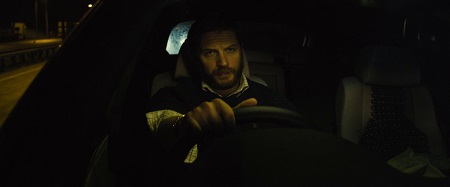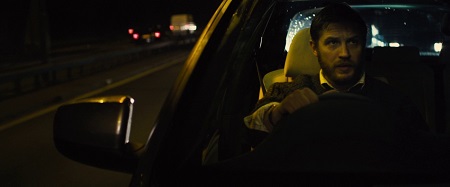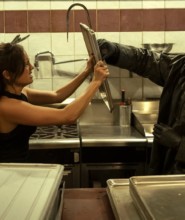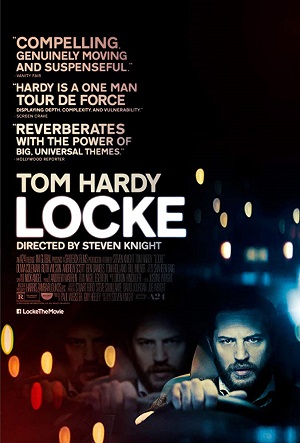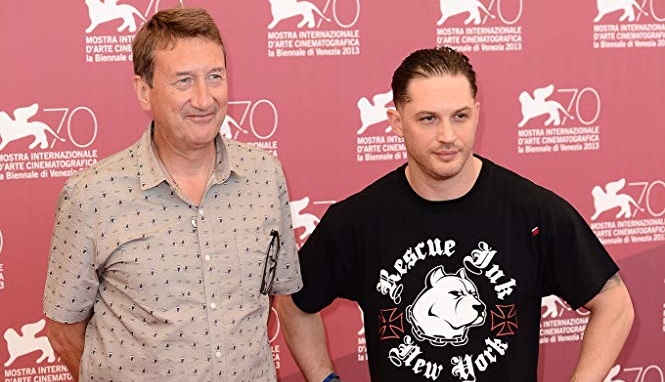
Out of the Ordinary
Steven Knight Talks About Keeping Locke In Drive
Veteran screenwriter Steven Knight received an Academy Award nomination for writing the script to Dirty Pretty Things, director Stephen Frears’ moody and dark London-based illegal immigration thriller revolving around underground organ harvesting at a seedy hotel. He’s followed that up with acclaimed screenplays for tense, dramatic suspense flicks as varied as David Cronenberg’s Eastern Promises and John Crowley’s Closed Circuit.
Yet as terrific as those efforts might be, nothing could prepare one for the intimate, quietly profound beauty of Locke. Knight’s second film as both writer and director (the first being the little-seen Jason Statham drama Hummingbird, released here in the U.S. under the title Redemption), Locke is an action flick with no real action. It is a ticking clock thriller where nothing blows up or has immanent dangers hiding around unforeseen corners. Instead, it is a real-time saga of a man, Ivan Locke, played with breathtaking urgency by star Tom Hardy, making a life-changing decision and then dealing with the aftermath, everything happening during a 90-minute nighttime drive to London.
On his recent visit to Seattle I had the opportunity to sit down with the Oscar-nominated filmmaker to talk about his drama, his writing process and other various topics. Here are some of the highlights from that conversation:
Sara Michelle Fetters: Talk to me about Ivan Locke. Where did he come from?
Steven Knight: The original thought was to create the most ordinary man in the world, the most boring man in Britain, and then take away any element that felt like ‘film’ in the conventional sense. He’s married. He has two kids. He’s a construction supervisor. He specializes in concrete, which is one of the most unglamorous materials there probably is. Into that life I wanted to throw in a hand grenade, but not a real one, not a bomb or a death in the family or a car crash, anything like that. Just some sort of life-changing mistake an ordinary person could make. That sort of thing. Because, by doing so, we could then watch his life unravel in great detail. That, but also related to the idea of how we all deal with phone calls, how our lives are accessible to everything at all times now, I thought it – that juxtaposition would be fascinating. You look at how people see how a certain individual is calling them and they shrug or they sigh, becoming a completely different person when they choose to answer, all of us doing this master class of acting seemingly every day, I wanted to capture that in some way, but in a situation of extreme stress.
Sara Michelle Fetters: I love that it is entirely accurate to call Locke a ticking-clock thriller, but at the same time it is also a complete misnomer.
Steven Knight: It is. It’s one of those things where I hope people struggle to name the genre the film resides within. Just like any normal person’s life, the film doesn’t take place within a single genre. I hope [Locke] is seen as a bit of a comedy, a bit of a thriller, a bit of a melodrama, but at the same time you begin to feel that all of this is real, that everything happening was actually happening.
Sara Michelle Fetters: It’s a glorious reminder of both the stress and the beauty of everyday life is it not?
Steven Knight: Absolutely. The beginning, looking at all those cars, I hope that it suggests that unique bubble of life, that there is a story in every front seat and that you just pick one to take a look at. You pull away at the end and then there are potentially more. It’s never-ending. We’ve celebrated just one of them.
Sara Michelle Fetters: Yet, as ordinary as this might be, from a filmmaking perspective, I imagine this was quite challenging. You did make a real-time film entirely set in the front seat of a car driving along the freeway to London revolving around a single physical actor. What was going through your mind as you looked at the challenges of making all of this happen?
Steven Knight: A low budget certainly helps in this instance, because by keeping the budget low you get freedom, you get left alone. So, once that was established, you get a bit of a space where you get to say, okay, we get to do this the way that we want to. No one is going to tell us what to do. I mean, whenever you make a film there is always a logical practical reason not to do the logical practical thing. There’s always a person standing there telling you that you can’t do something.
It’s like that “Simpsons” episode where there’s this film crew, and the person making the film says that when they need a horse they take a cow and paint it to look like a horse. When asked why they don’t just get a horse they respond by saying they tie a herd of cats together and use that.
On actual film sets, there’s always that feeling that you should be doing something different than what you’re actually attempting to do. But with [Locke], it seemed logical to just get three cameras, put them on a vehicle, and then I would say, “Action!” and then we would set out and film for the next 90 minutes. We’d have the other actors in a hotel room so they could actually take and make all the phone calls that transpire over the course of the film. We did our best to shoot [the film] twice per night, so when we were finished we ended up with 16 different movies that we then got to cut together the best takes from in order to arrive at our finished drama. It was the logical way to make it, and because we didn’t have huge financial backing there was never anyone looking over our shoulder telling us not to make it that way.
Sara Michelle Fetters: Tell me more about that process, going through the entire script two or three times a night, having the remaining cast sitting in a hotel room doing their scenes in sequence, as if they were performing a play night after night after night.
Steven Knight: It just made sense. It allowed the actors, especially Tom, to calibrate their performances and to make their characters feel authentic. That first call is the first call, and by the time [Ivan’s] getting that climactic, important call from his son, he’s been through the mill over the course of that real-time journey. The only breaks were that every 30 minutes we had to change out the memory card in the camera, so every 27 minutes we’d have to pull over and get ready to switch those out. It was like a NASCAR pit stop. We’d change the lenses. Change the batteries. Change the memory card. Everybody out. Everybody in. Leave Tom alone so he stays in character. Back to filming.
Sara Michelle Fetters: Can you expound on your relationship with Tom? It seems like you two would really have had to have worked in intimate tandem in order to achieve your vision.
Steven Knight: He’s so brilliant. He’s so brilliant at becoming people. He became this person. Every night. Every time through. It was spellbinding. He’s able to make it look like all that’s happening, everything he’s feeling or saying, is coming that very second. It’s all so natural. The fact he loves theater and the fact he invested so completely into doing this so intimately meant that we never had concerns as to whether or not our star was happy, because no one would be happy if they were actually living through something like this. It was cold. It was rainy. He was stuck inside a car. Tom used all of that. He became Ivan Locke, body and soul. He was just brilliant.
Sara Michelle Fetters: Maybe it was because I’d literally just watched Night of the Iguana and Where Eagles Dare right before this one, but I felt like I could see a little Richard Burton in Hardy’s performance. Am I wrong, or was this something you noticed as well?
Steven Knight: Absolutely. You’re not wrong at all. The reason being, [Tom] listened to a lot of Burton before filming in order to get the accent for the character right. It’s the Richard Burton accent, but it isn’t an impersonation or a trick. There is a decidedly Welsh quality to what Tom does that feels perfectly authentic. He was inspired by Burton, but he was also inspired by a number of other things as well, and this allowed him I think to make the character entirely his own. He was able to give Ivan Locke life.
Sara Michelle Fetters: How did you work with the other actors? You were on the mobile set with Tom and the film crew while the rest of your cast was off in a hotel room. What was that like?
Steven Knight: We spent five days going through the script with Tom and the other actors before filming began. Most of the direction for all the character stuff was done then, so when we went out onto the road we were all equipped with all we had to do. I kept communication [with the other actors] to an absolute minimum because I didn’t want to interrupt the reality of the situation. Other than the rare times we had to pull over to the side of the road, it was always, this isn’t a movie, this is a play, deal with whatever comes up.
Sara Michelle Fetters: You had some extraordinary British talent sitting in that hotel room. Did you ever worry that they were going to get bored? That they were going to want to go off and do something else? That they wouldn’t want to come in night after night and do the same things two or three times over?
Steven Knight: It was 9:00 p.m. to 4:00 a.m., every night, for over a week, and all they had was red wine and biscuits. But, seriously, all the cast bought into what we were trying to do completely, and I think the read-throughs really helped convince them all this was something we could pull off. And, that was key, because as you’ve said, these are some of the best actors working in Britain today, so it was important that we had them completely on board with what we were trying to do.
After a few nights, I admit I felt obliged to show them some footage, because I felt like I needed them to know that this was real, that this was actually happening. They saw the footage and realized immediately what was going on, what it was we were bringing to life. And, I mean, their performances are all so good. So real. It allowed us to try so many different variations in many of the scenes.
Because they were all so good, we could experiment with the idea that when people get shocking news, at first they oftentimes are initially okay, but then they slowly get worse before succumbing to some sort of eerie calm, the emotions roiling underneath. It’s like they build up to the shock. It’s like Ivan’s wife, played by Ruth Wilson, she gets angrier and angrier as the night goes on before really giving it to him at the end, yet sounds perfectly rational, almost calm, when she finally does so. People are one thing during one moment and then something completely different in the next; there is no uniformity as far as emotions are concerned.
Sara Michelle Fetters: Which is what makes Ivan so interesting. He’s in pain. You can see it. Yet he maintains this level of control that’s unnerving. He’s almost a superhero, in this fashion, if you will.
Steven Knight: He is heroic. That’s the thing; he’s heroic in a very ordinary way. His job is always solving problems, sourcing things out, calming other people’s doubt and stopping panic from developing. That’s what he tries to do here. But his mantra of moving on to the practical next step? That’s never going to work. Not in this situation. Watching him slowly realize that, but unable to change gears or switch directions, is kind of heartbreaking.
Sara Michelle Fetters: You shot Hummingbird with Academy Award-winning cinematographer Chris Menges. What did you learn from him that you were able to utilize here?
Steven Knight: It’s so interesting that you bring him up, because no one has really spoken about [Chris] and he’s such a huge influence. He was the one, when we were shooting Hummingbird, that would always ask, “Why are there so many trucks?” What he meant by that, when you turn up to shoot, there are all these trucks filling up the street, and he’s like 74, 75, and he’s embraced the digital technology, he wished he’d had these cameras when he was young. To that point, he doesn’t need all those trucks. Sees them as excessive. He wants to go in; he wants to find the truth in the image. He’s got this aversion to lighting things, wants to use as much of the natural energy and light of a given set as he can, and now he’s got the technology to be able to do just that. So, in other words, you don’t need all the trucks.
Sara Michelle Fetters: At the end of the day, what do you hope audiences take away from watching Locke? What do you want them to be talking about?
Steven Knight: The key for me was the Salt Lake City screening. We did Sundance, which was great, but in Salt Lake City I felt like we were showing the film to what I considered Middle America, not film people. There were middle-aged men, a lot of older women, it wasn’t an audience you’d expect to go to a somewhat experimental film of this nature. Afterwards, there were all these really long handshakes, all these sincere emotions, and they weren’t remarking about the experimental nature of the making of the film, they were remarking about the emotional journey the character had just been on. They were really relating it to their own lives. It meant something to them.
So, that’s what I want. I want audiences to respond just like that. I’m so glad that responses like that are happening. I hope they continue.
– Interview reprinted courtesy of the SGN in Seattle
